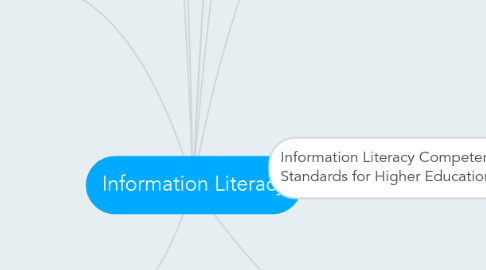
1. Able to
1.1. Determine the extent of information needed
1.2. Access the needed information effectively and efficiently
1.3. Evaluate information and its sources critically
1.4. Incorporate selected information into one’s knowledge base
1.5. Use information effectively to accomplish a specific purpose
1.6. Understand the economic, legal, and social issues surrounding the use of information, and access and use information ethically and legally
2. The importance
2.1. surrounded by a growing ocean of information in all formats.
2.2. Not all information is created equal
2.3. The amount of information available is going to keep increasing.
2.4. The types of technology used to access, manipulate, and create information will likewise expand.
3. Computer literacy
3.1. the knowledge and ability to use computers and technology efficiently
4. Library Literacy
4.1. the ability to use a library's collection and its services
5. The ability to identify what information is needed, understand how the information is organized, identify the best sources of information for a given need, locate those sources, evaluate the sources critically, and share that information.
6. participating fully in a democratic society as an informed citizen by understanding issues and voting.
7. Definition
8. How to use the skills
8.1. academic purposes
8.2. Used on the job
8.3. Consumer decisions
9. Information Literacy Competency Standards for Higher Education
9.1. conceptual framework for assessing the information literate individual.
9.2. FIVE standards with Performance Indicators and Outcomes.
9.2.1. Standard one: The information literate student determines the nature and extent of the information needed.
9.2.2. Standard two: The information literate student accesses needed information effectively and efficiently.
9.2.3. Standard three: The information literate student evaluates information and its sources critically and incorporates selected information into his or her knowledge base and value system.
9.2.4. Standard four: The information literate student, individually or as a member of a group, uses information effectively to accomplish a specific purpose.
9.2.5. Standard five: The information literate student understands many of the economic, legal, and social issues surrounding the use of information and accesses and uses information ethically and legally.

